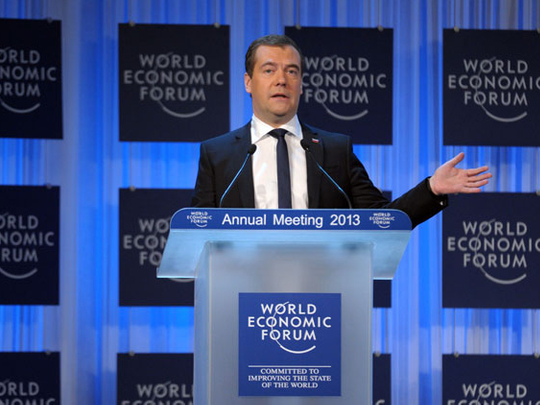
Davos
The Russian government is making every effort that anyone coming to Davos knows that Russia is open for business as Moscow prepares to host the G20 later in the year. Russia has launched a very high profile public relations blitz aimed at the media and large companies at this year’s World Economic Forum.
Unfortunately for the Russians, Prime Minister Dmitri Medvedev launched the charm offensive with a lacklustre speech at a plenary session on the first day, in which he called for closer union with the European Union to build a single economic space stretching from the Atlantic to the Pacific. But this dramatic vision was lost in a mass of economic detail, and a lengthy defence of his government’s plan to focus on increasing the efficiency of Russian public bodies, which may be a worthy aim but failed to capture the Davos audience.
But the Russians will be busy all week. Leading global accountancy and consulting firm PwC later hosted a major open panel discussion in the specially designated House of Russia outside the Congress Centre. This included Sergei Guriev of the New Economic School in Moscow, Leonid Grigoriev of the Higher School of Economic in Moscow, Pavel Andreev of the Valdai Club Foundation, and David Gray of PwC.
And in coming days, the House of Russia will field talks and panels at strategically timed moments in the programme. These include people like Vladimir Dmitriev, Chairman of Vnesheconombank (VEB), one of Russia’s larger state corporations performing functions of the Bank for Development as it seeks to diversify the Russian economy; Ruben Vardanian, Co-Head of Sberbank CIB, which has just launched a corporate & investment banking arm; Andrey Kostin, President and Chairman of the VTB Bank, is also part of the charm offensive, backed by his chief economist Maxim Oreshkin who will summarise VTB’s report on the Russian economy and makes forecasts for 2013.
And Kirill Dmitriev, CEO of The Russian Direct Investment Fund (RDIF), will talk about the $10 billion fund his company manages once it was established by the Russian government to make equity investments primarily in the Russian economy.
What is impressive about this campaign is the level of access that leading Russian companies are offering as they seek to re-engage with the global economy, and re-assure the major banks and corporates that Russia is still a good place to do business.












